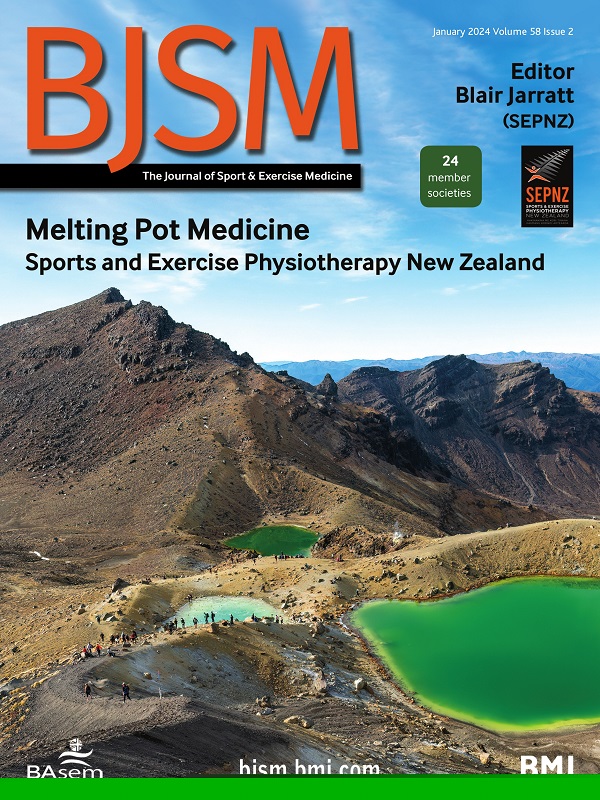Could not prescribing exercise for depression be psychiatric malpractice?
IF 16.2
1区 医学
Q1 SPORT SCIENCES
引用次数: 0
Abstract
The prevalence of depression is increasing, with 290 185 742 people with a documented depression globally in 2019.1 People with depression experience a significantly increased risk of numerous physical diseases, such as obesity, diabetes, high blood pressure and heart failure, among others.2 Traditionally, the primary treatment modalities for depression include antidepressants and psychotherapy. While effective in some instances, a considerable portion of the population (30%–50%) does not respond to these treatments. Further, these interventions do not target and may instead exacerbate physical ailments in some instances.3 There has been increasing recognition of the use of exercise as a treatment for depression. Recent meta-analyses have demonstrated that exercise has anti-depressant effects comparable to those of medications or psychotherapy, with simultaneous multisystem benefits to one’s physical health.4 5 Beyond depressive symptoms, exercise has established efficacy in preventing and managing a plethora of physical comorbidities, many of which disproportionately affect people with depression.6 Exercise has also demonstrated potential to reduce suicide attempts in those with depression.7 As such, exercise has been adopted as a first-line treatment in guidelines for depression globally with good acceptability and safety.6 8 Despite this, clinically, exercise is uncommonly prescribed or prioritised in the psychiatric setting.9 In a survey of mental health professionals, most (92%) stated that they had received no formal training in exercise prescription.9 While medication was …给抑郁症开运动处方难道不是精神上的失职吗?
抑郁症的患病率正在上升,2019年全球有记录的抑郁症患者为290,185,742人。1抑郁症患者患多种身体疾病的风险显着增加,如肥胖、糖尿病、高血压和心力衰竭等传统上,抑郁症的主要治疗方式包括抗抑郁药和心理治疗。虽然在某些情况下有效,但相当一部分人(30%-50%)对这些治疗没有反应。此外,在某些情况下,这些干预措施并不针对身体疾病,反而可能加剧身体疾病人们越来越多地认识到锻炼可以作为治疗抑郁症的一种方法。最近的荟萃分析表明,运动具有与药物或心理治疗相当的抗抑郁作用,同时对身体健康有多系统益处。除了抑郁症状,运动在预防和控制过多的身体并发症方面已经确立了功效,其中许多对抑郁症患者的影响不成比例锻炼也被证明有可能减少抑郁症患者的自杀企图因此,在全球范围内,运动已被采纳为抑郁症指导方针的一线治疗方法,具有良好的可接受性和安全性。尽管如此,在临床上,在精神病学的设置中,运动很少被规定或优先考虑在一项对心理健康专业人员的调查中,大多数(92%)表示他们没有接受过运动处方方面的正式培训而药物治疗……
本文章由计算机程序翻译,如有差异,请以英文原文为准。
求助全文
约1分钟内获得全文
求助全文
来源期刊
CiteScore
27.10
自引率
4.90%
发文量
217
审稿时长
3-8 weeks
期刊介绍:
The British Journal of Sports Medicine (BJSM) is a dynamic platform that presents groundbreaking research, thought-provoking reviews, and meaningful discussions on sport and exercise medicine. Our focus encompasses various clinically-relevant aspects such as physiotherapy, physical therapy, and rehabilitation. With an aim to foster innovation, education, and knowledge translation, we strive to bridge the gap between research and practical implementation in the field. Our multi-media approach, including web, print, video, and audio resources, along with our active presence on social media, connects a global community of healthcare professionals dedicated to treating active individuals.

 求助内容:
求助内容: 应助结果提醒方式:
应助结果提醒方式:


